- Home
- Scott Mariani
The Armada Legacy bh-8 Page 21
The Armada Legacy bh-8 Read online
Page 21
Parked in a ring closer to the centre of the clearing was a cluster of open-topped Jeeps and a truck, around which stood a team of twenty or so heavily-armed men, all looking up intently at the chopper coming in to land.
The helicopter touched down. Serrato waited for the rotors to slow and the dust to settle, then stepped from the aircraft and straightened his suit. The immaculate beige silk struck a contrast against the jungle clothing of the men who walked across from the vehicles to greet him. Bracca sheathed his Bowie knife, grabbed his rifle from the floor of the chopper, and he and Vertíz jumped down after their boss to flank him, one either side, as they’d been doing for years.
‘Where’s Vargas?’ Serrato asked the ground team leader, Raoul.
‘They’re on their way, boss. Radioed in five minutes ago.’
Serrato nodded. ‘And so everything went as planned?’
‘Sure, boss.’ Raoul motioned behind him at the thick forest beyond the edge of the clearing. ‘All taken care of, just like you ordered.’
‘Was there any resistance?’
Raoul grinned. ‘Nothing we couldn’t handle.’
‘I want to see,’ Serrato said.
‘Sure, boss,’ Raoul repeated, but his words were drowned out by the buzzing approach of the second helicopter. They looked up, shading their eyes from the dazzling sun, as the bright red JetRanger appeared over the forest. Its pilot brought it carefully down to land thirty metres away across the clearing. The aircraft’s side hatch opened and a short, stocky, olive-skinned man in a rumpled white suit clambered down with some help from his aides, clutching at the rim of his Panama hat to keep it from flying off in the hurricane from the rotors. He waved to Serrato and crossed the razed earth towards him.
The man was in his fifties, with a cheerful round face that sported a carefully trimmed moustache and belied the fact that he was almost as calculating and ruthless as Serrato himself.
Almost, but not quite. His name was Aníbal Vargas, and he was a senior member of the Peruvian government’s Ministry of Housing, Construction and Sanitation, the department concerned, among other loosely defined matters, with the registration and administration of rural land deeds. He was also one of several men in the country who knew exactly with whom he was dealing in Ramon Serrato, and had no problem doing business as long as it was well away from the prying eyes of the press and the political reform activists who made his life far harder than he felt he deserved.
Vargas had amassed himself a small fortune during the last twenty years, massively augmenting his government salary by quietly and illegally offering concessions to oil, gas and logging operations willing to pay a premium kickback for the chance to sneak in and devastate great swathes of rainforest that were supposed to be protected in the interests of indigenous people. He’d always operated comfortably under the radar, shielded by the fact that Peru’s regulatory framework was weak, the infrastructure rotten, and the whole system generally so beleaguered by inefficiency and incompetence that neither the bureaucrats nor most of the public even cared any more.
As for the rainforest Indians themselves, aside from the occasional uprising against outsiders coming to plunder their ancient territories, their rights were as easily squashed in modern times as they’d been throughout history, going right back to the Conquistadors.
It was the same story in Peru as in Paraguay, Colombia, the whole tropical Amazon basin. In their time the Indians had been bribed, cheated, shot at, burned out of their homes, murdered wholesale, and their numbers ravaged by diseases contracted accidentally from outsiders – or sometimes introduced on purpose. The Natural Protected Areas Law of 1997 had made little real difference to their plight, although the steady growth of welfare organisations such as MATSES, the Movement in the Amazon for Tribal Subsistence and Economic Sustainability, was a pain in the butt for men like Aníbal Vargas and his colleagues, whose unofficial purpose it was to undo any progress they achieved.
‘You’re late,’ Serrato said.
Vargas was more at home in an air-conditioned office than in the middle of the jungle. He was already perspiring heavily as he stammered his apology, beating away the insects that swarmed around his face, drawn to the scent of fresh sweat. The heat didn’t bother Serrato. He was cool and calm. He said to Vargas, ‘Now let me show you what your department should have been doing.’
‘Are we going in there?’ Vargas asked, pointing at the jungle and thinking of venomous snakes and spiders as large as his hand that could scuttle up a trouser leg and sink their fangs into soft flesh. Serrato only nodded. Vargas lifted his hat to wipe the sweat from his balding scalp.
It was cooler under the trees. The jungle was strangely quiet, deserted by the hordes of howler monkeys and the many, many birds whose calls would normally fill the air. It was the silence of death.
The team leader went first with a couple of his men. Serrato followed, still closely flanked by Vertíz and Bracca who were eyeing every leaf and frond with suspicion, their loaded, cocked weapons at the ready. Vargas stumbled along in their wake, cracking twigs with every step and swatting at flies, and the rest of the ground team brought up the rear. Eighty yards into the dense, lush thicket, Serrato paused to peer at the shaft of an arrow embedded in the knotty bark of a tree.
‘Tricky little bastards,’ the team leader said with a knowing smile. ‘Handy with those fucking darts, too.’ He showed Serrato the hole above his breast pocket and tapped the lightweight Kevlar body armour underneath that was capable of turning a high-powered handgun bullet at point-blank range. ‘Lucky for us we came equipped.’
Serrato plucked the arrow out of the tree bark. A black, glutinous substance was still trickling from its barbed head. Poisons had always fascinated him. He wondered what rainforest plant or creature – a fish? A frog? – the Indians had concocted this from, and what its effects were. Maybe he’d experiment with it. He tucked the arrow under his arm like a swagger stick.
‘Remind me of the name of this tribe?’ Vargas said as they trudged through the heavy undergrowth.
‘Who gives a shit?’ Bracca rumbled, and the politician went quiet.
It was another thirty yards farther up the narrow machete-hacked path that they came to the first of the bodies. The corpse lying twisted across the path belonged to an older Indian male, maybe in his late thirties. He was short and stockily built with a shock of glossy black hair, almost naked except for a tiny loincloth and an arrow quiver. He was still clutching the shaft of his bow and the arrow he’d been about to loose when most of his head had been blown away by a bullet. Next to him lay the curled-up body of a teenage boy. White ribs were exposed where a shot had torn away the muscle and flesh of his side. His torso was slick with blood.
‘That one’s not dead,’ Vargas said, pointing. They all looked and saw that Vargas was right. The boy was moving weakly, trying to claw his way forwards over the bloody ground.
The team leader issued a short command. One of his men walked up to the dying teenager, unsnapped his belt holster and drew out a 9mm Beretta.
Serrato held up his hand. ‘No!’
The soldier lowered his pistol uncertainly.
Serrato took a couple of deliberate steps away. ‘The silk is so hard to clean,’ he explained to Vargas. Once he was out of range of any blood spray he nodded to the soldier and walked on. A moment later the flat report of the pistol cracked out. Serrato didn’t so much as glance back.
‘Dead now, all right,’ Vertíz chuckled, exchanging grins with the others. The government minister was looking pale.
The rest of the Indians lay scattered among the devastated remnants of their village a little way farther on. The bodies and the dark patches of blood soaked into the forest floor were already crawling with huge black hairy flies whose buzzing filled the air. What was left of the primitive village dwellings and store huts would soon be flattened into nothing by the massive machines when the deforestation operation moved in.
‘This surely can’t be a
ll of them,’ Serrato said to the team leader, pointing at the corpses.
‘Twenty-seven,’ the team leader replied. ‘Out of an estimated population of fifty or sixty. Looks like they knew we were coming and got the women and children out just in time. Only the male warriors stayed behind to defend the place. But we’ll catch up with the rest pretty soon if we can find some tracks to follow. These fuckers move through the jungle like ghosts.’
‘Find them,’ Serrato said. ‘Before they can make contact with other tribes and word starts to spread. I want this situation contained and resolved as soon as possible.’
Away from the men he said sternly to Vargas, ‘This is more trouble than I should have to deal with.’ Before the politician could launch into an apologetic reply he demanded, ‘The land is mine, is it not?’
‘Yes, technically, but …’
‘Technically? I’ve presented all the necessary documentation. I’ve demonstrated sufficient proof of entitlement. The escrituras were transferred to my name as of yesterday.’
The property deeds Serrato was referring to normally took up to thirty-three days to register under the Peruvian legal system. He hadn’t been prepared to wait anything like that long and had spent a great deal of time on the phone whipping his lawyers to get the complex paperwork through the necessary channels as fast as possible. A five-hundred-year-old land title signed by Philip II of Spain might not have been a document that the clerks saw every day, but with land ownership laws in the state of confusion that they were and Vargas and his people greasing the wheels to ensure that Serrato’s claim was rubber-stamped, the deal had gone through as smoothly as he could have wished. Bribes had been paid to all the right people; all the right arms twisted; all the right veiled threats made.
It had mattered very little to anyone concerned that the land in question was a protected native community reserve. God bless Peru.
‘The land is mine,’ Serrato repeated emphatically. ‘I shouldn’t even have to go to the trouble of clearing out these Indians. They’re meant to be your department.’
‘It’s a delicate business, Señor Serrato,’ Vargas protested. ‘What am I supposed to do, with these interfering do-gooder bastards from MATSES and Fenamad breathing down my neck the whole time?’ He glanced nervously at the soldiers, who were wandering among the ruins of the Indian village out of earshot. ‘It is not just I who has to be careful. If certain people got wind that government officials were colluding with … with …’ from the look in Serrato’s eye Vargas knew he had to choose his words with extreme care, ‘with a private individual such as yourself, to clear half a million acres of protected virgin rainforest without the proper authorisation and set up the biggest unofficial oil drilling operation Peru has ever seen …’
‘The oil is there,’ Serrato said. ‘You have seen the test results.’
‘The tests conducted illegally …’
‘But conclusive nonetheless. And you also know how much you stand to gain if the wells yield even half of my consultants’ estimate.’
‘… not to mention this.’ Vargas waved a finger at the grisly corpses and wrecked dwellings, and shook his head.
‘We agreed on what would have to be done to vacate the land.’
‘I did not agree to such a slaughter,’ Vargas replied in a raspy whisper. It was the first time he’d ever seen so much blood and death, and the large breakfast he’d wolfed down before getting on the chopper was threatening to make a reappearance every time he looked at the bodies or caught a whiff of their smell. ‘There are limits, Señor Serrato. Even here in Peru there are limits. Things are not the way they used to be. This new president we have now may be an idiot, but he is an idealistic idiot who believes in progress and reform. You have no idea how things are at my end.’
Serrato gave a smile. ‘My dear Aníbal, you are beginning to sound somewhat less enthusiastic about our project than you were at the outset. Which I must say disappoints me, after so much planning, so many meetings and discussions. I believe I made it very clear to you from the start exactly how I intended to proceed once I had secured the necessary document.’ He took the poisoned arrow out from under his arm and waved its tip casually through the air as he spoke. ‘However, if you no longer wish to remain involved in the project, please say the word. It will be taken care of immediately.’
Vargas looked at the poisoned arrow and swallowed. If he said the word, he was a dead man. He’d be buried here in the rainforest with these poor bastard Indians. Then he thought about his share of the cash once the oil started pumping. Who cared if it wasn’t legal – what was? His days of skimming off the top, chasing after kickbacks, worrying about getting caught, would be over forever. He’d be able to afford more Italian suits, younger hotter mistresses, the black Porsche he coveted to go with his gold one, and that luxury beach house he’d had his eye on for a while. The shopping list stretched tantalisingly out in his imagination.
‘Please forgive me, Señor Serrato. You can rely on my complete support. There will be no problems from me, I guarantee it.’
Serrato was about to deliver a cuttingly sarcastic reply when his mobile phone started ringing. He plucked it from his suit pocket and saw that the call was from one of his subordinates in Bogotá. It was one he’d been expecting.
‘We got Morales,’ the voice on the other end told him.
Serrato had done this kind of thing too often to feel any pleasure or excitement from it. Ordering the kidnap and torture of a fellow Colombian, in this case an ex-cop in league with others standing in the way of his plans, was as routine to him as ordering a gallon of milk.
‘Did he talk?’ Serrato asked. If the answer to the question was no, it would mean that the men had managed to let Felipe Morales die before they’d got the information out of him. That, in turn, would mean further deaths as punishment for the error.
‘Oh, he talked all right, boss. He was a tough one, though. Had to show him the chainsaw before he cracked, and that was after we’d already taken off his fingers …’
Serrato wasn’t concerned with the trivial details. ‘Where’s Ramirez, where’s Cabeza?’
‘Spain. Place called Montefrio. We have people on the way there.’
‘Good. I want all trace of them erased.’ Serrato put away his phone. He glanced archly at the piles of dead Indians by the ruined huts. ‘This place stinks,’ he said. ‘Let’s go.’
Chapter Thirty-Seven
It was coming on for five in the afternoon and the winter evening was drawing near by the time the battered Subaru rolled up outside the holiday rental cottage in the sleepy village of Montefrio near the Cordoba border, a sprawl of white houses and terracotta roofs surrounded by the hills and olive groves of Granada and dominated by an ancient fortress-like church perched high on a rock.
Ben could understand why Nico had chosen such an out-of-the-way spot to hide Cabeza, though it wasn’t a choice he personally agreed with. He’d always preferred safe houses in crowded cities, where a targeted individual could disappear far more easily. In cities, nobody gave a shit about anybody – whereas small communities were always conscious of strangers in their midst, and the presence of strangers tended to generate loose talk.
But then, Nico was a cop, and cops couldn’t always know these things.
La Catalina was a modestly-sized former granary on the edge of the village, with thick stone walls painted white like all the other homes in Montefrio. Nico parked the car round the back and led Ben inside, carrying the machine carbine wrapped in his jacket.
It was warm inside the house. The Colombian hung the SIG from its sling over the banister post in the hallway. ‘Professor Cabeza!’ he called out; then again, more loudly, ‘Hey, Cabeza, where the hell did you go, man?’ No response.
Left alone for a few moments while Nico went off to search the house, Ben wandered into the main room and glanced around. The furnishings were simple and rustic: a pitted slab table; an old pine dresser; some canvas chairs. A single large window
looked out onto a terrace with a view of the high rocky mound, the church seeming to hang off the side of the lopsided precipice, just waiting to come sliding down to crush the whole village below. The table was littered with history books, papers and a laptop – the kind of things he could imagine a man like Cabeza insisting on bringing with him from home. Next to them was a glass of white wine, half finished and lukewarm to the touch. He walked over to the dresser and pulled open the middle drawer.
He could hear Nico calling Cabeza’s name in the background, sounding increasingly irritated.
Stepping back to the table, Ben touched the finger pad of the laptop and the sleeping machine sprang back into life. Whoever had been using it last, presumably Cabeza, had been looking at a website about the history and architecture of Montefrio. The photos on the site looked similar to the view from the window, except that they’d been taken in summer when the high rock was lush with greenery.
Between the images was a piece of text describing the origin of the church. As quickly as Ben learned that it was called the Iglesia de la Villa and had been built in 1486 on the site of a much older Moorish castle following the defeat of the Muslim kingdom of Granada by Christian armies, he shoved that knowledge to the remotest corner of his mind and minimized the webpage to click into the laptop’s email program.
‘Cabeza! Come on, man! It’s okay, it’s me!’ came Nico’s muffled voice from another room. Ben could have called out to him not to bother – Cabeza clearly wasn’t there – but he was too busy reading the email exchange he’d just found between the historian and Roger Forsyte. The messages dated back from the discussions arranging their meeting in Spain, all the way back to early December: the time when, according to what Simon Butler had told Ben in Southampton, Forsyte had salvaged the mysterious casket from the wreck of the Armada warship.

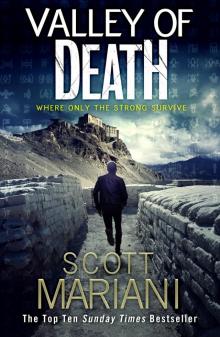 Valley of Death
Valley of Death House of War
House of War The Pandemic Plot
The Pandemic Plot The Pretender's Gold
The Pretender's Gold The Demon Club
The Demon Club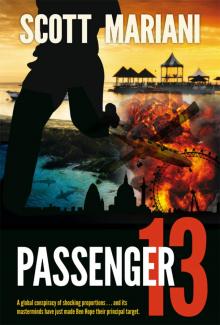 Passenger 13 (Ben Hope eBook originals)
Passenger 13 (Ben Hope eBook originals)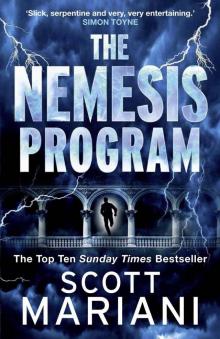 The Nemesis Program_Ben Hope
The Nemesis Program_Ben Hope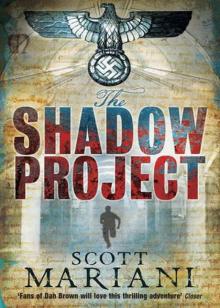 The Shadow Project
The Shadow Project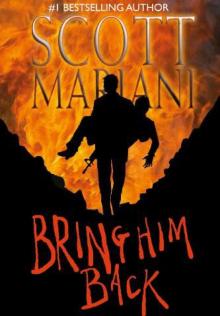 Bring Him Back
Bring Him Back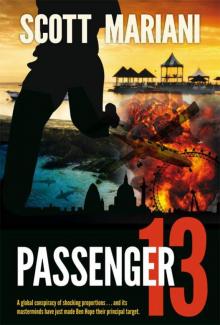 Passenger 13
Passenger 13 Sacred Sword (Ben Hope 7)
Sacred Sword (Ben Hope 7) The Sacred Sword (Ben Hope 7)
The Sacred Sword (Ben Hope 7) Sacred Sword
Sacred Sword The Babylon Idol
The Babylon Idol The Armada Legacy
The Armada Legacy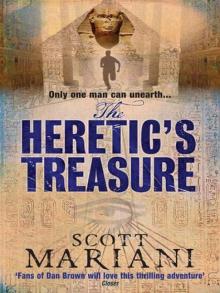 The Heretic's Treasure
The Heretic's Treasure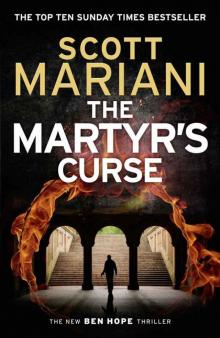 The Martyr’s Curse
The Martyr’s Curse DECOY (Kindle Single)
DECOY (Kindle Single) The Bach Manuscript
The Bach Manuscript The Alchemist's Secret
The Alchemist's Secret The Mozart Conspiracy: A Novel bh-2
The Mozart Conspiracy: A Novel bh-2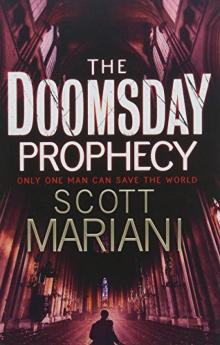 The Doomsday Prophecy
The Doomsday Prophecy The Ben Hope Collection: 6 BOOK SET
The Ben Hope Collection: 6 BOOK SET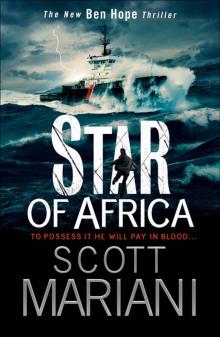 Star of Africa (Ben Hope, Book 13)
Star of Africa (Ben Hope, Book 13)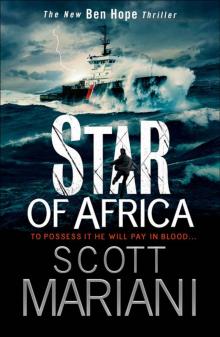 Star of Africa
Star of Africa The Forgotten Holocaust (Ben Hope, Book 10)
The Forgotten Holocaust (Ben Hope, Book 10) The Devil's Kingdom
The Devil's Kingdom The Lost Relic
The Lost Relic The Armada Legacy bh-8
The Armada Legacy bh-8 The Rebel's Revenge
The Rebel's Revenge The Forgotten Holocaust
The Forgotten Holocaust The Lost Relic bh-6
The Lost Relic bh-6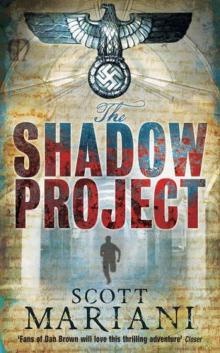 Ben Hope 05 - The Shadow Project
Ben Hope 05 - The Shadow Project The Mozart Conspiracy
The Mozart Conspiracy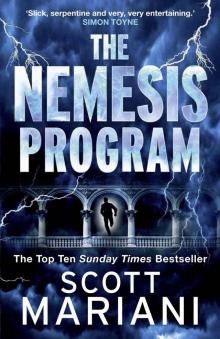 The Nemesis Program
The Nemesis Program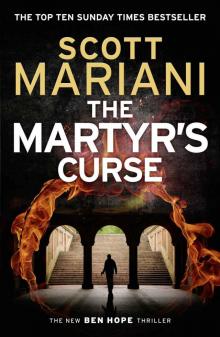 The Martyr’s Curse (Ben Hope, Book 11)
The Martyr’s Curse (Ben Hope, Book 11) THE TUNNEL: A Ben Hope Story
THE TUNNEL: A Ben Hope Story The Sacred Sword bh-7
The Sacred Sword bh-7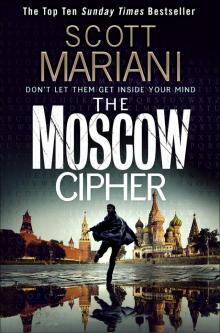 The Moscow Cipher
The Moscow Cipher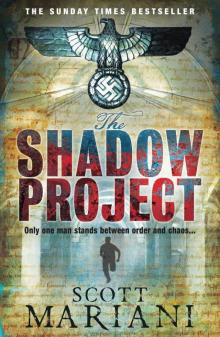 The Shadow Project bh-5
The Shadow Project bh-5 The Tunnel
The Tunnel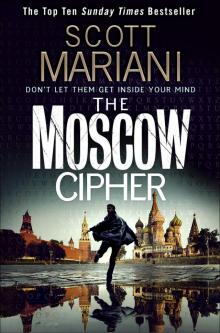 The Moscow Cipher (Ben Hope, Book 17)
The Moscow Cipher (Ben Hope, Book 17)